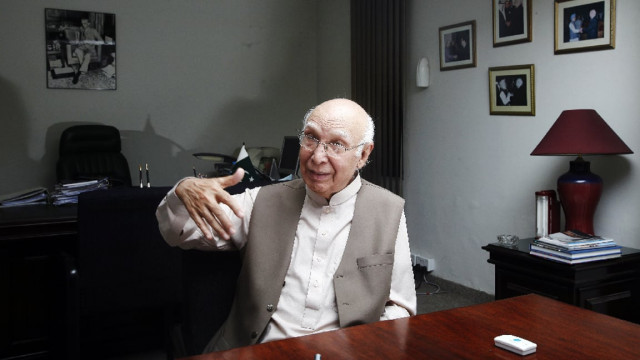Neighbourhood watch: Afghan media deeply divided over Sartaj Aziz’s visit
Some analysts feel sceptical about Pakistan’s intentions of restarting peace talks.

Adviser to the Prime Minister on Foreign Affairs and National Security Sartaz Aziz. PHOTO: REUTERS
Security and Foreign Affairs Adviser Sartaj Aziz’s visit to Kabul has been viewed with much scepticism in Afghanistan.
In a move to lessen diplomatic tensions, Pakistan on Sunday sent its top foreign affairs official to Afghanistan to deliver a formal invitation to President Hamid Karzai to visit Islamabad.
Earlier in the month when Prime Minister (PM) Nawaz Sharif phoned Karzai to invite him to Islamabad, he insisted that first Pakistan’s security adviser should visit Kabul to discuss the agenda for talks between both sides.
Islamabad agreed to Karzai’s proposal and thus Aziz paid a visit to Kabul handing him a formal invitation letter from PM Sharif. Karzai reportedly accepted the invitation, but attached some conditions to the visit.

The Pakistan Foreign Ministry is satisfied with the outcome of Aziz’s visit. The ministry’s spokesperson Aizaz Ahmad Chaudhry said on Thursday the meetings in Kabul were held in a cordial atmosphere. Chaudhry expressed hope the two countries would work together on an agenda that leads to lasting peace, stability, and prosperity in Afghanistan and the region.
In Kabul on the other hand, the approach to the visit is completely different. The presidential palace had stated, “President Hamid Karzai accepted the invitation in principle with thanks, however, he had stressed that a high-level Afghan delegation would visit Pakistan when the agenda of the visit includes serious and effective campaign against terrorism and towards the Afghan peace process.”
Afghan media and analysts, who are always critical of Pakistan’s policy towards the country, are deeply divided over Aziz’s visit and his statement that ‘though Pakistan has contacts with the Taliban, the Taliban are not under its control.’ Aziz’s other remark that Pakistan can support the peace process, but cannot guarantee its success has also drawn criticism.
All major Afghan TV channels extensively debated the visit and almost all newspapers published editorials on the matter.
The independent newspaper, Afghan Mandegar Daily, described Sartaj Aziz’s visit to Kabul as “bargaining to bring Taliban back to the scene,” while the independent Cheragh Daily in its editorial said: “We all know the current crisis in Afghanistan stems from Pakistan’s interference in Afghanistan’s domestic affairs.”
Meanwhile, the Hasht-e-Sobh Daily on July 22 wrote: “Pakistan will not use its influence on the Taliban for launching peace talks but to intensify the war in Afghanistan.”
However, Daily Afghanistan expressed optimism about the matter. It said the visit shows that Pakistan wants to take positive steps in strengthening the two countries’ political and trade relations.
The state-run Anis Daily has followed a similar line. “The people of Afghanistan hope that with the establishment of the new Pakistani government, a new page of friendship and neighbourliness will be opened,” it said.
During TV debates, Wahid Mozhda, a popular analyst said, “Pakistan maintains its influence on the Taliban, Islamabad wants to gain privileges from the Afghan government and the international community.”
Zubair Shafiqi, a writer and journalist, told Shamshad TV he did not see anything new in Aziz’s remarks. While other political experts were optimistic over the visit and said the foreign affairs adviser’s visit reflects Islamabad’s intentions that it wants to help in the peace process.
Waqef Hakimi said the visit was an opportunity to change the tense atmosphere. He urged the Afghan government to take this positively, adding all problems in Afghanistan were not caused by Pakistan.
The time is ripe for the two countries to cooperate and put the peace process back on track. Instead of only looking at its interests in Afghanistan, Pakistan will have to take practical steps to facilitate reconciliation. Time is running out and Islamabad will also have to act now to avoid instability in Afghanistan following the withdrawal of foreign troops next year.
On the other hand, Kabul must stop using its media to blame Islamabad for all ills. Instead, it must take up its reservations through diplomatic channels and existing bilateral forums.
Published in The Express Tribune, July 27th, 2013.













COMMENTS
Comments are moderated and generally will be posted if they are on-topic and not abusive.
For more information, please see our Comments FAQ